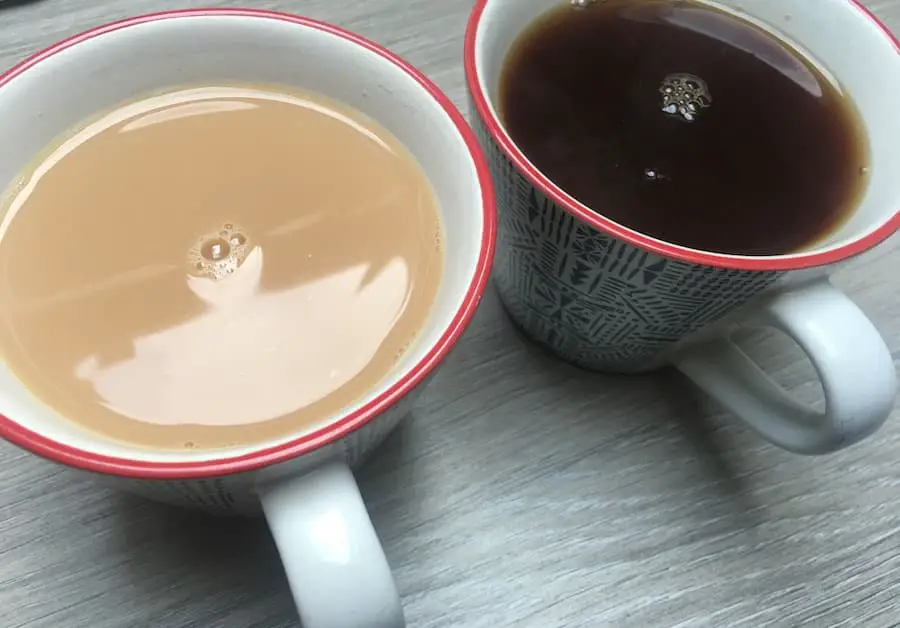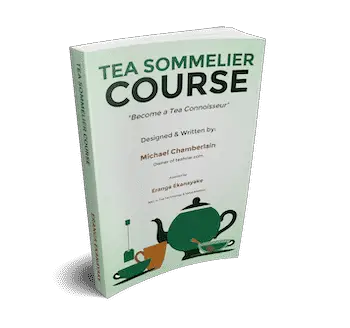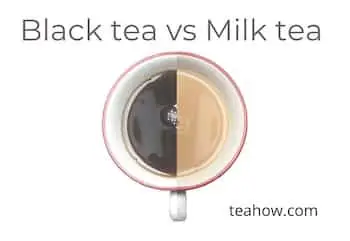Aside from one main major difference, are you wondering which is better? Black tea vs Milk tea?
Well, in this article, I’m going into some detail on the main differences, the benefits of each, flavor, properties, and more.
But first, here’s a quick roundup summary, then we’ll get into the details…
Black tea vs Milk tea?
The base component for both black tea and milk tea is black tea. They are both variants of the same tea. The main difference is the addition of milk in milk tea. Both share similar properties and health benefits, but adding milk reduces the health benefits and alters the flavor profile.
Here’s a comparison table showing the main differences in the profile of black tea vs milk tea.
| Black Tea | Milk Tea | |
|---|---|---|
| Flavor profile | Strong, sharp, and astringent | Malty and creamier due to the addition of milk |
| Properties | Numerous health properties | Milk reduces the health properties of black tea |
| Caffeine Level | 47mg per cup (approx) | 47mg per cup (approx) |
| Calories | 2 | 10 for skimmed milk and 30+ for whole milk |
| Cups per day | 4-5 | 2-3 |
| How to brew | 3-5 minutes for loose-leaf black tea | 3-5 minutes for loose-leaf black tea |
What are they? Black tea vs Milk tea
Both black and milk tea are two types of the same tea. Both black tea and milk tea are made from the true tea plant that is the “Camellia Sinensis” – and more specifically using only a black tea variety which is one of the four basic types of tea.
Black tea
Black tea is the type of true tea variety that goes through the highest oxidation process, and so exhibits a darker color and a stronger flavor than other types of tea.
The only element that makes milk tea different from a cup of regular black tea is the addition of milk.
Milk tea
Although milk tea simply refers to the addition of milk to a cup of black tea, nowadays even green, white, oolong, rooibos, or even other herbal or fruit teas are experimented with by adding milk.
And I guess why not …manufacturers experiment with this type of tea already and produce variations on the same theme.
These days milk tea is experimented with and sold in different varieties in different countries.
To that end, milk tea can also be a “Bubble tea”. Bubble tea, or Boba tea, is a Taiwanese cold tea that is mixed with condensed milk, other ingredients, and balls or ‘pearls’ of tapioca. Read all about bubble tea in my article on the complete guide to bubble tea.
Black tea though can be a simple and elegant drink, whereas milk tea can make it a different flavor profile and a wholesome drink for many …just with the addition of a splash of milk.
This just shows that tea can be plain and traditional or molded into a complex tea including numerous other ingredients along with, or aside from milk.
You can also explore my post on the best teas to drink without milk.
Flavor – Black tea vs Milk tea
What does each one taste like? There are of course a multitude of variations, depending on aspects such as the blend of tea and how much milk, but here’s an outline for those accustomed to black tea…
Black tea taste
Black tea has its own unique and timeless flavor that’s often described in a million ways, such as earthy, malty, citrus, caramel, leather, fruity, smoky, nutty, brisk, metallic, honey, and sweet.
In simple terms though, black tea has a bold, brisk, and astringent flavor profile.
Milk tea taste
Milk tea, on the other hand, doesn’t reflect the strong or sharp flavors of regular black tea.
Instead, it takes all the flavor of a black tea taste and tempers it to a smoother and creamier taste with the addition of milk.
So if you’re looking for the strong astringent flavor, with the full-on tannins of black tea – but from a milk tea, you may be disappointed.
A milk tea tastes more on the caramel, malty, nutty, and sweet side of a regular black tea. Of course, the type and quality of the milk make a huge difference in the flavors of a milk tea.
Apart from the flavor, milk tea has a creamier texture than the sharp bitter aftertaste of black tea.

Properties – Black tea vs Milk tea
Black tea has groups of polyphenols such as epigallocatechin gallate, thearubigins, theaflavins an amino acid L-theanine, and several other catechins or flavonoids.
I go into some of these properties in a more easy-to-understand way in my Tea Sommelier Course.
These health-giving properties protect against many chronic health conditions.
But milk… milk is rich in nutrients, such as protein, calcium, and potassium. These properties support optimal growth, body composition, and bone health.
While that’s the properties of black tea and milk individually, combining these two into milk tea is not believed to provide as many properties as they do individually.
On the contrary, rather than a more substantially healthy beverage, studies suggest that the properties of the protein found in milk may actually interfere with the absorption and antioxidant properties of black tea.
Caffeine – Black tea vs Milk Tea
In an 8 oz cup of black tea, there’s an average of 47.4 mg of caffeine.
Surprisingly, if you use the same amount of black tea for milk tea, there’s usually very little change in the caffeine content.
For example, if you use one tea bag or one teaspoon of tea leaves for black tea and use the same ratio for milk tea, the caffeine content will be the same.
So the addition of milk doesn’t make any difference to the caffeine content.
You can reduce the caffeine in milk tea by adding more milk and reducing the amount of tea you use for a cup of tea.
However, in milk tea, you may not feel the same punch of caffeine as a cup of black tea delivers.
So let’s get down to which is healthier to drink.
Calories – Black tea vs Milk tea
Black tea has fewer calories than milk tea. But, the calorie count can vary when adding milk, depending on the type and quantity of milk added.
A cup of plain black tea with no sugar contains on average just 2 calories, whereas a cup of milk tea with skimmed milk and no sugar has 10 calories. Adding full cream milk can increase this to 30+ calories.
This makes black tea a clear-cut winner with the lowest calories and also combines that with it being a healthier option than milk tea again.
But of black tea and milk tea, how much should you look to be drinking per day? This too varies.
Which is healthier? Black tea or Milk tea
Although milk brings it’s own set of health benefits, it has no real health benefits when it comes to milk tea.
I’ve hinted that there’s no compound benefit effect of milk added to black tea. And in fact, it’s pretty clear-cut that black tea is more healthy than milk tea.
There are many reasons why black tea on its own is healthier than milk tea. So let’s go a bit more into what those reasons are…
Why black tea is healthier than milk tea
One main reason that’s been highlighted, is that the addition of milk to black tea tends to bind casein, a protein in milk to the flavonoids in black tea.
This binding prevents the activity of the flavonoids in the body, thereby eliminating the healthy benefits of black tea in general.
However, some researchers say that brewing tea for longer for milk tea can in fact help the tea better absorb antioxidant flavonoids …and thereby help them perform their activity in the body, despite adding milk.
Another important factor is that tea is very well known for its health benefits in terms of increasing blood flow, which helps in improving heart function.
Studies have concluded that adding milk to black tea did not support this health benefit, thereby making milk tea vaguer in terms of being a healthy option.
Of course, the negative health benefits are more likely to be compounded when you add greater quantities of milk. This could apply to tea such as Chai.
But before we start hating on Chai, I should point out that Chai generally includes numerous Indian spices that provide other alternative health benefits.
Adding milk for vegans
For the vegans among us, you would likely not choose cow’s milk – for obvious reasons. So something like almond milk or soy milk might be their milk of choice. But, sadly, both Soy and Almond milk also reduce the positive health effects of tea. So for the full health effect, perhaps black tea is the way to go for vegans too.
How many cups of black or milk tea per day is healthy?
You should look to consume a maximum of 4 or 5 cups of plain black tea within a day and is safe and healthy.
On the other hand, you should look to have a maximum of 2 or 3 cups of milk tea within a day.
If you use fattier milk or more sugar/sweeteners, then stick to 2 cups. Having more – particularly later in the day could cause sleep issues.
I have a whole guide on how many cups you should drink per day of different teas.
How to brew Black tea and Milk tea
Add one black tea bag or one tablespoon of black tea leaves for a cup (8 oz.) of hot water. With a temperature between 200 F and 212 F.
Steep for 3-5 minutes, strain, and add sugar if desired.
To brew milk tea, you can just brew a regular cup of tea the same way as explained above. But perhaps with less water for about 6 (oz.), because you’ll be adding milk that will take up a portion of the cup.
Once the steeping is done, you can strain and add milk and then add sugar if needed.
If you don’t have milk to hand, then you can make a cup of milk tea with milk powder.
You can always increase the steeping time for a stronger flavor. And of course, you can add more milk if you like your tea even milkier.
Here’s a simple black tea brewing option…
Don’t forget to check out my Tea Sommelier Course, it’s proving popular as a simple but perfect way to get into the world of tea. Without lots of expensive equipment, or decades of knowledge.

Take the fast track and become a tea connoisseur
Whether for enjoyment or considering a career as a tea sommelier. This course has everything you need to enhance your tea knowledge and tea-tasting skills.
This course keeps it simple with step-by-step tea tasting and easy reference guides
For pleasure, or as a precursor to a career in the tea industry. Find out what tea sommelier actually does, their career paths, and what they earn.

Find out more about the Teahow Tea Sommelier Course!
